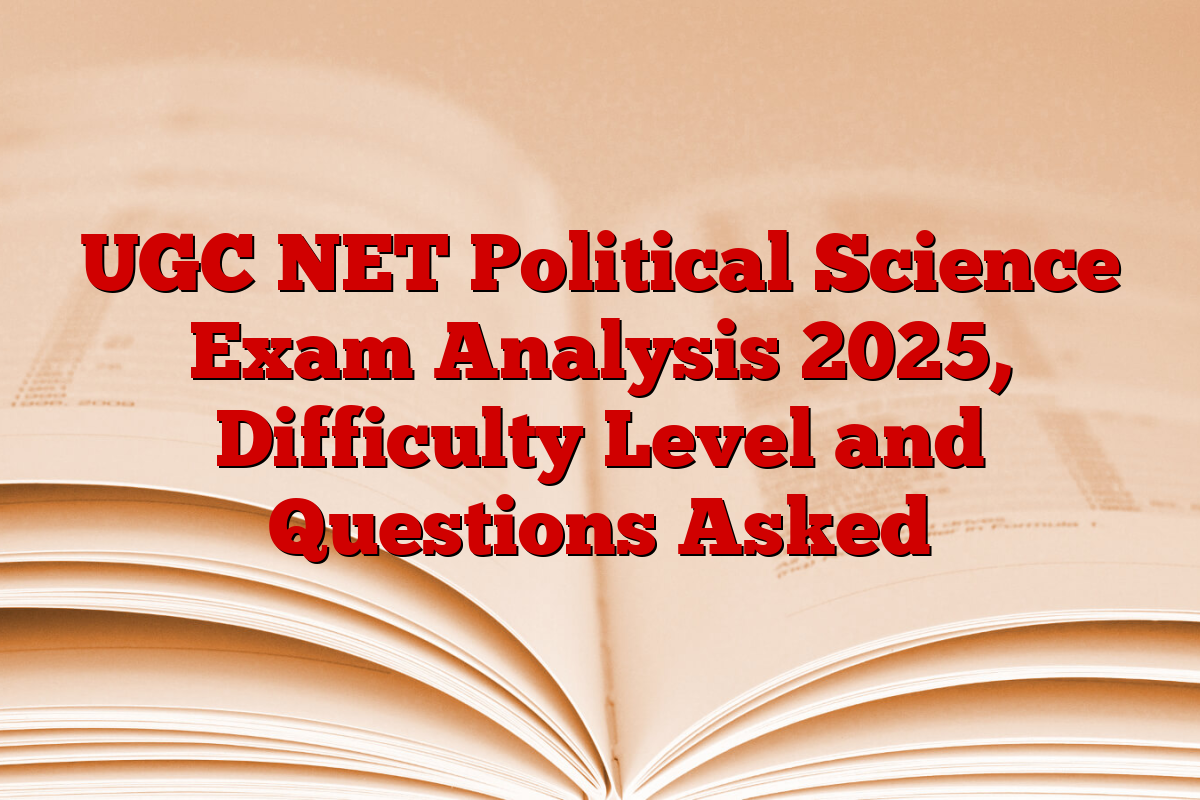Aspirant! National Testing Agency (NTA) has successfully conducted the UGC NET Political Science examination for December 2025 cycle today i.e. on 6th January 2025. The examination, conducted in Computer-Based Test (CBT) mode, was conducted in 2nd shift i.e. 03. From :00 PM to 06:00 PM. This article provides detailed insight into the overall analysis of the exam, including difficulty level, main subjects and other relevant details, with an aim to assist candidates appearing in future sessions.
UGC NET Political Science Exam Feedback by Students
Feedback from students who have appeared for the UGC NET Political Science exam reveals a workable mix of question patterns and difficulty levels. Here are the highlights shared by the candidates:
- data interpretation: Questions were mainly of easy to moderate difficulty, testing fundamental analytical skills.
- reading comprehension: This section was considered easy, with simple paragraphs requiring basic interpretation and understanding.
- logical reasoning:Candidates had to face questions based on inverse relationshipWhich required careful analysis and reasoning.
- Quantitative Aptitude:The exam included questions related to ascending and descending orderProblem-solving requires an application-based approach.
- match the following: Questions related to alignment of concepts and definitions were also included, emphasizing the need for accurate knowledge.
- chronology based questions: Significant emphasis was placed on understanding and arranging historical or administrative events in sequence.
Top tips from students
- focus on practice chronological order And match the following Pattern.
- Pay special attention to logical reasoning concepts such as contradictions.
- Data interpretation and reading comprehension can be improved through regular practice to maintain accuracy.
UGC NET Political Science Exam 2025 Schedule
UGC NET Political Science Exam 2025 was conducted in 2nd shift. Each shift lasted three hours without any break. Below is an overview of the schedule:
| UGC NET Computer Science Paper 2025 Exam Schedule |
|||||
| shift | paper | Mark | Number of Questions (Compulsory) | Duration | Time |
| shift 2 | I | 100 | 50 | 3 hours (no break) | 03:00 PM to 06:00 PM |
| II | 200 | 100 | |||
| exam date | 6 January 2025 | ||||
ugc net political science exam pattern
UGC NET Political Science exam is conducted online in the form of Computer Based Test (CBT). The exam structure is divided into two sections:
| paper | Mark | number of questions | mcq details | total duration |
| I | 100 | 50 | Designed to test reasoning ability, comprehension, general awareness and teaching/research aptitude. | 3 hours (no break) |
| II | 200 | 100 | Focusing on subject-specific, political science concepts and theories. |
UGC NET Political Science Exam Analysis for Paper I
The detailed analysis of subjects and difficulty levels for Paper I is given below:
| subjects | level | number of questions |
| teaching qualification | Easy | 4 |
| research ability | easy-medium | 5 |
| Understanding | medium | 5 |
| logical reasoning | Easy | 4 |
| data interpretation | Easy | 4-5 |
| Mathematic | medium | 6 |
| Communications | easy-medium | 3 |
| people and development | easy-medium | 2-3 |
| higher education | easy-medium | 3 |
| information technology | Easy | 5 |
| Total | easy-medium | 37-41 |
UGC NET Political Science Exam Analysis 2025 Section Wise
Subject wise UGC NET Political Science paper analysis is mentioned in the article below. UGC NET Paper I will consist of 11 sections which include Teaching Aptitude, Research Aptitude, Comprehension, Logical Reasoning, Data Interpretation, Mathematics, Communication, Environment, People and Development, Higher Education and Information Technology. UGC NET Political Science paper analysis for Shift 2 subject wise and questions asked are given below.
| subjects | UGC NET Political Science Paper 1 Afternoon Shift |
| teaching qualification | Inquiry Based Learning, Virtual Lab Experience, Online Tools- Kahoot, Padlet, Cooperative Learning, Risk Assessment Chronological Sequence, Skill Commission, Content Analysis, Meta Cognition, Cognitive Apprenticeship |
| research ability | Standard Deviation, Match Columns, Mean-Median-Mode, Type of Research |
| Understanding | based on heart disease |
| logical reasoning | Fallacy, Square of Opposites, Deductive Reasoning, Mood and Figure, Team-Pi-Solo |
| data interpretation | Percentage Based Graphs, Easy-Medium |
| Mathematic | Percentage, Ratio, Profit and Loss, Coding Decoding, Algebraic, Number Series, Directions, 3-8-15-24-35-48 Series, Probability |
| Communications | Mass Media, Media Frequency, Spiral Model of Communication, Radio Broadcasting, Mindmaster, Edupuzzle, Radio, Walkie Talkie, Computer to Mouse, Computer to Printer, |
| People, Environment and Development | Environment Act (Chronology), Chernobyl Nuclear Disaster, Jar Testing, Agenda 2021 International Agreement, Pollution, Bhopal Gas Water Pollution, Heart Disease, Wildlife Protection Act, Male-Female Ratio, |
| higher education | Chronology of University, Open University, Chronology of Events of 3 Year Plan, Education Commission, NAAC, Aryabhata, Nuclear Power Plants – Phases, UGC Quality Assessment Institute Based Matching |
| information technology | Android Developer, Memory, Decimal System, CPU, Binary Decimal, Cyber Security- Phishing, Facebook and the beginning of Apple Computer, Google OS, Ascending Order – SSD, Optical Disk, DRAM, SRAM and Registers |
UGC NET Political Science Exam Analysis for Paper II
| UGC NET Political Science Exam Analysis Subject Wise | |
| UGC NET Political Science Exam Analysis | Total Questions |
|
52-57 |
| Total | 52-57 |
| exam level | medium |
sharing is Caring!
